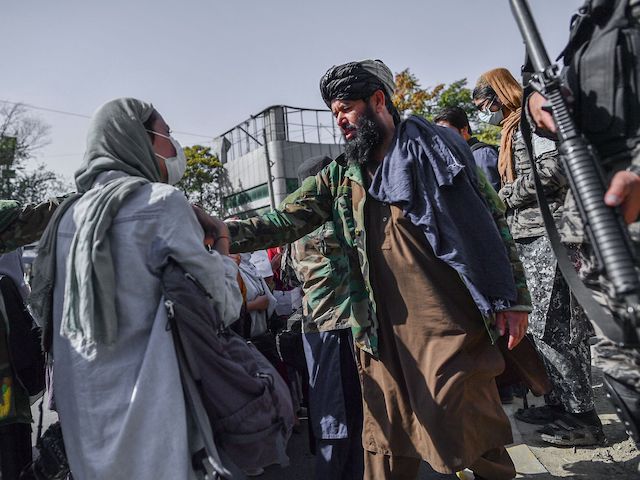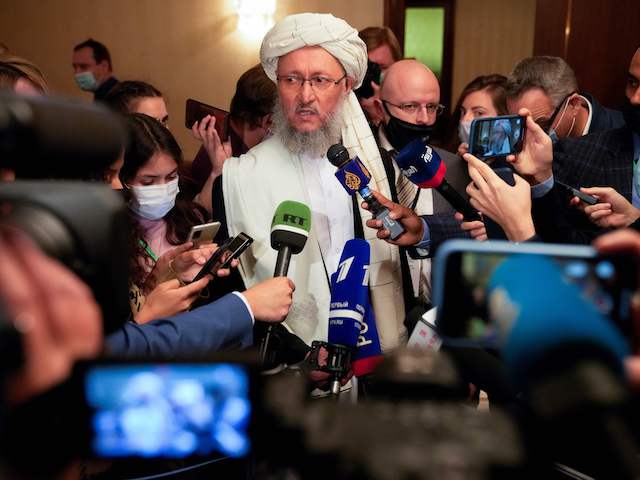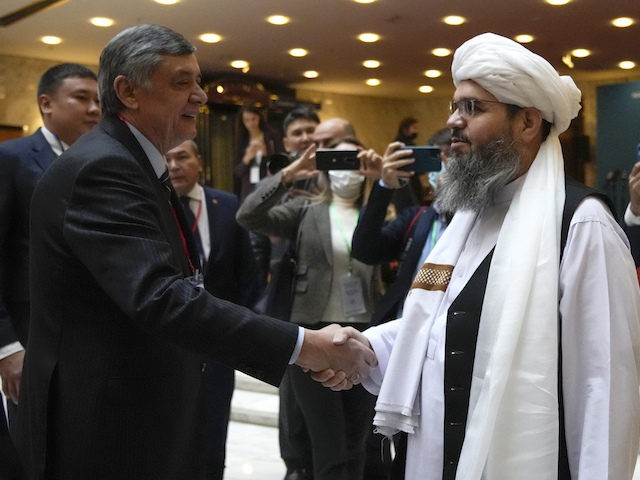Nine countries led by Russia – including powerhouse neighbors China, Russia, and Iran – published a statement Wednesday effectively recognizing the Taliban terrorist group as the government of Afghanistan.
The statement represented the position of the countries attending the “Moscow Format Consultations on Afghanistan” this week, a summit led by the regime of Russian leader Vladimir Putin to discuss how to proceed in relations with Afghanistan, a neighbor to all parties attending. The Taliban seized control of the country from what is now the former legitimate government in August, invading Kabul and prompting then-President Ashraf Ghani to flee. The Taliban chose to invade the capital and seize the entirety of the country after President Joe Biden broke an agreement to withdraw U.S. troops from Afghanistan. American forces invaded Afghanistan in the aftermath of the September 11, 2001, al-Qaeda jihadist attacks.
In addition to the participating nations – Russia, China, Pakistan, Iran, India, Kazakhstan, Kyrgyzstan, Turkmenistan and Uzbekistan – the Moscow meeting featured representatives of the Taliban jihadist organization.
Russian officials allowed them to attend despite the fact that, unlike the United States, Russia considers the Afghan Taliban a designated terrorist organization. Taliban officials openly stated that they hoped the meeting would lead to some of their neighbors officially recognizing the Taliban as a state actor and the legitimate government of Afghanistan.
The joint statement, published by the Russian Foreign Affairs Ministry, stops short of such formal recognition. Instead, it declares that the Taliban controls the nation in practice, so formal recognition of any other alleged government does not matter.
“The sides reiterated their respect to the sovereignty, independence and territorial integrity of Afghanistan,” the statement read in part, “and reaffirmed their commitment to Afghanistan as a peaceful, indivisible, independent, economically developing State, free of terrorism and drug-related crime and respecting the basic norms in the human rights area.”

Taliban members stop women protesting for women’s rights in Kabul on October 21, 2021. (Bulent Kilic/AFP via Getty Images)
Any “practical engagement” with the country, the statement asserted, would require recognition that the Taliban governs Afghanistan. State actors “needed to take into account the new reality, that is the Taliban coming to power in the country, irrespective of the official recognition of the new Afghan government by the international community.”
The nations in question added that they hoped the Taliban would adopt “moderate” policies and remain “friendly … towards neighbors.” It went on to refer to the Taliban as the “interim Afghan government.”
The statement concluded with a promise that the countries involved would organize a United Nations effort to fund the Taliban “as soon as possible.”
Taliban spokesman Zabihullah Mujahid has posted statements online since, following bilateral meetings between participating nations and Taliban leaders that appear to indicate those countries would also formally invest in the jihadists under the guise of humanitarian aid for Afghan citizens.
Mujahid posted a comment on Wednesday citing an Indian diplomat who promised his Taliban counterpart “extensive humanitarian assistance” for Afghan people. Pakistan, an Islamist nation and longtime Taliban hideout, also reportedly promised 5 billion rupees ($28,860) in aid to “Afghanistan.” Russia promised support for “a better future for Afghanistan,” according to Mujahid, but it remains unclear if Moscow will do more than pressure Western nations to fund the Taliban given the group’s terrorist designation in Russia.

Head of the Taliban delegation, deputy prime minister Abdul Salam Hanafi speaks to the media during an international conference on Afghanistan in Moscow on October 20, 2021. (Alexander Zemlianichenko/Pool/AFP)
The Taliban has prioritized fundraising since it took over the capital in August. As the jihadists do not enjoy formal recognition as a government in the free world, they do not have access to Afghan government funding from institutions such as the World Bank and the International Monetary Fund (IMF), both of which froze Afghan assets following the collapse of the former government. The Taliban has also failed to access $10 billion in reserves at the Afghan Central Bank for similar reasons.
Taliban envoys have enthusiastically courted China as a potential benefactor, praising the Belt and Road Initiative (BRI), a global debt trap campaign China uses to ensnare vulnerable countries with promises of aiding infrastructure development.
“China is a big country with a huge economy and capacity — I think they can play a very big role in the rebuilding, rehabilitation, reconstruction of Afghanistan,” Taliban spokesman Suhail Shaheen said in an interview in August. Mujahid, another spokesman, said in an interview last week that Chinese companies have expressed interest in financing and exploiting the Mes Aynak copper mine, Afghanistan’s largest of its kind.
“China is a neighbor and has a strong economy. We are trying to develop trade and economic relations with them,” Mujahid said. “However, although we want China to have trade and investment with us, we will not tolerate any interference in our internal affairs.”
Beijing has not formally recognized the Taliban but has expressed interest in investing in the country, pressuring the Taliban to support its genocidal campaign against Uyghur Muslims on the other side of the Afghan border. It has instead focused on using the Taliban to attack the United States and urge the American government to cooperate with the terrorist group.

COMMENTS
Please let us know if you're having issues with commenting.